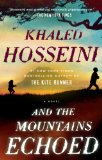Summary | Excerpt | Reading Guide | Reviews | Beyond the book | Read-Alikes | Genres & Themes | Author Bio

Labeled by some as the "Libyan Kite Runner",
In The Country of Men does share some similarities with
Khaled Hosseini's runaway bestseller in that both are about
young boys growing up in countries experiencing political
implosion, with the result that their boy-sized mistakes take on
adult-sized consequences; but Matar's prose is leaner than
Hosseini's, and his themes share more with Ian McEwan's
Atonement than with The Kite Runner. Matar's writing
is arrestingly evocative, blending raw emotion with tiny,
seemingly incongruous details seen through the eyes of a child,
details that serve to fill the adult reader, who can interpret
what the child sees in the wider context, with fear as he or she
picks up the traces of impending doom lurking behind the
innocuous.
The plot centers on nine-year-old Suleiman who struggles to
cope with his enigmatic father's increasing absences and his
mother's frequent "illnesses" for which she takes "medicine"
sold to her by the baker in brown paper bags. Under the effect
of alcohol, 24-year-old Najwa pours out her frustration as a
woman in a "country of men" on the son she never wanted (but now
dotes on when sober), telling him about her hasty marriage to a
man twice her age (because she was seen holding hands with a
boy) and her fears that the anti-state activities of her husband
put not just him but his whole family in danger.
In the morning, when she's forgotten most of what she said and
refuses to discuss what she remembers, Suleiman is left with his
burden of half-understood knowledge and a permanent sense of
'quiet panic', still retained by the adult narrator looking back
on his childhood, desperately loving his mother and physically
pained by his desire to save her. Outside of Suleiman's home,
life is no less uncertain. He witnesses his best friend's
father being taken away by security forces and hung on national
TV; and the games that the neighborhood boys play become darker
and more dangerous as events in Libya become more repressed and
violent and the menacing shadow of Colonel Qadaffi ("the Guide")
and his all-seeing security network take over the country.
In The Country of Men combines a hard-hitting political
novel with a tender story of love and forgiveness which opens
the eyes of those who read it to the cruelty of Qaddafi's long
and still ongoing rule of Libya. A reminder worth noting
at a time when the leaders of the western world are so eager to
wipe Libya's slate clean that in the space of less than two
years Libya's designation as a a state sponsor of terrorism has
been lifted and the country has been elected to a seat (albeit
non-permanent) on the UN's Security Council.
Hisham Matar was born in 1970 in New York City where his
father, Jaballa Matar, worked for the Libyan delegation to the
United Nations. When Hisham was three years old, his family
returned to Libya to live in the capital city of Tripoli, where
he spent his early childhood, until political persecution forced
his mother to flee with her children. They first went to
Kenya and then to Egypt, where they settled in Cairo.
Hisham and his brother, Ziad, attended a school with 70 pupils
per classroom (the only school they could afford) and were badly
bullied. Later, Hisham's father managed to get out of Libya and
join them in Cairo where he began his political work in earnest
- speaking out against the Libyan regime and mobilizing the
various factions of the exiled Libyan resistance to unite in
order to overthrow Qaddafi.
In 1986, Hisham moved to London, England where he received a
degree in architecture. In 1990, while he and his brother were
both in London, their father was taken away by the Egyptian
secret police. The family heard nothing until 1996 when they
received two smuggled letters in Jaballa's hand written a year
earlier, and a tape recording stating that he had been kidnapped
by the Egyptian secret police and handed over to the Libyan
regime where he was imprisoned in the notorious Abu-Salim prison
in Tripoli. Since then, nobody has heard from him.
Hisham Matar's first novel, In the Country of Men, was
shortlisted for a number of literary prizes including the 2006
Man Booker Prize. It won the 2007 Commonwealth First Book
Award for Europe and South Asia, the 2007 Royal Society of
Literature Ondaatje Prize, the Italian Premio Vallombrosa Gregor
von Rezzori, the Italian Premio Internazionale Flaiano (Sezione
Letteratura) and the inaugural Arab American National Museum
Book Award. To date, In the Country of Men has been
translated into 22 languages. Hisham Matar lives in London
where he is working on another novel set in Cairo and London. He
is married to American-born photographer
Diana Matar.
Interesting Links
![]() This review
first ran in the February 21, 2008
issue of BookBrowse Recommends.
This review
first ran in the February 21, 2008
issue of BookBrowse Recommends.

If you liked In the Country of Men, try these:

by Kenneth Bonert
Published 2014
A thrilling ride through the life of one fumbling young hero, The Lion Seeker is a glorious reinvention of the classic family and coming-of-age sagas.

by Khaled Hosseini
Published 2014
Khaled Hosseini has written a new novel about how we love, how we take care of one another, and how the choices we make resonate through generations
Your guide toexceptional books
BookBrowse seeks out and recommends the best in contemporary fiction and nonfiction—books that not only engage and entertain but also deepen our understanding of ourselves and the world around us.